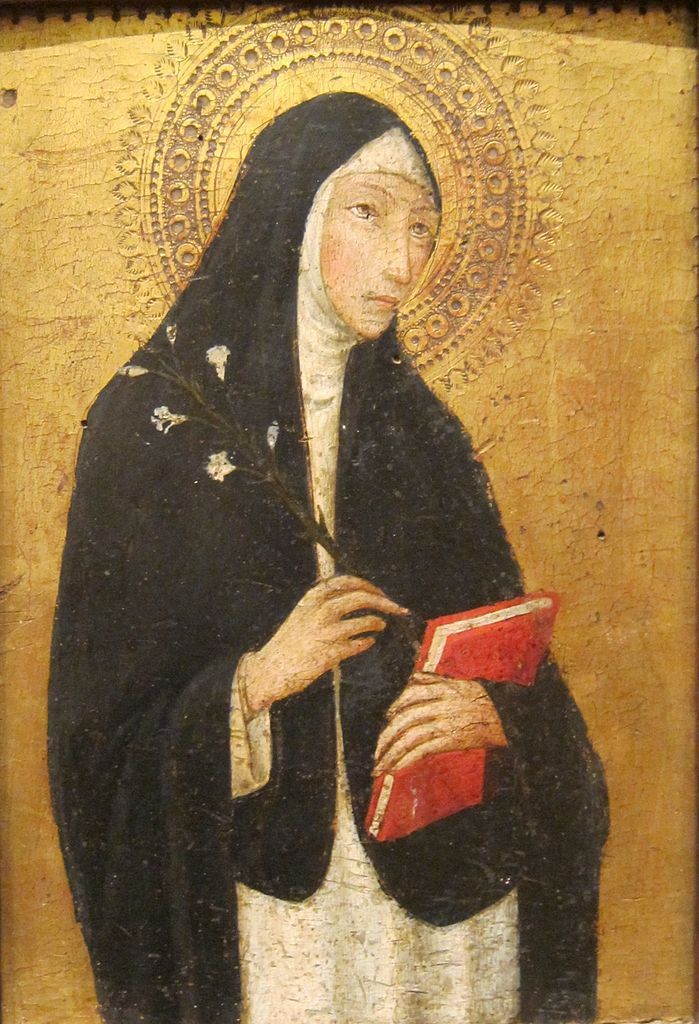
Life (1347? - 1380)
Stars differ in “magnitude”. So do saints. Some clearly excel others. But, of all the spiritual stars, Catherine of Siena is one of the very greatest. Catherine was the 23rd child of James Benincasa, a devout dyer of Siena, and his hard-working but unimaginative wife, Lapa. From the age of reason, she showed herself a bright and religious child. When she was only seven, she had a vision which prompted her to decide never to marry. As she matured, her parents even brought pressure on her to enter marriage. But she stood firm, and eventually they consented to her wish to join the Third Order of the Dominicans and to live a hidden life of prayer and self-discipline in her own home. During the next three years, 1365-1368, she advanced so rapidly in her prayer-life that Christ appeared to her and took her as his special “bride”. Catherine now received from Him an order to leave her little domestic “hermitage” and carry his message of love to the outside world.
Between 1368 and 1374, Catherine Benincasa became accepted by a large number of men and women, young and old as their spiritual “mother”. To them, she began to write an important series of letters – soul counsel. As time went on, she also wrote about international concerns, including a projected crusade of Christians against the Turks. In 1374 opponents arose to criticize her as a presumptuous busy-body. But the Dominican Fathers, having examined her beliefs and attitudes, placed their stamp of approval on her and her work. Clearly, she was a born leader.
Between 1374 and 1378, Catherine was called upon to exercise a broad influence in public affairs. The Republic of Florence, at odds with Pope Gregory XI, sent her to visit the Pope at Avignon, France, to make peace between Florence and the papal states. She failed in that task, but she was more successful in urging the Pope, who, like several of his predecessors had been living in France, to return to his proper residence, Rome. It was during these years that she achieved her widest influence. At the same time she began to write her Dialogues, in which she set forth loyal but strong criticisms of the public faults of some Church leaders. In these years, too, she received the grace of the stigmata – Christ’s wounds on her body.
When Gregory XI died in Rome in 1378, the cardinals elected an Italian archbishop as his successor, Urban VI. But when these cardinals found that Urban would not cater to them, they forthwith declared his election invalid, and chose another prelate as Pope Clement VI. Clement, a Frenchman, settled in Avignon. Thus began that terrible tragedy, the Great Schism of the West. It lasted 37 years, and during this period Catholics were sorely divided on the question which was the true Pope. Catherine defended the claim of Urban VI, even though she sometimes scolded him for imprudence in his words and actions. This grievous division of Christendom brought her from Siena to Rome, where she spent the rest of her life. She was constantly in correspondence with princes and prelates of many lands to win them over to Pope Urban. Even more importantly, she offered herself as a victim to God for the peace of the Church; and she suffered much.
It was in Rome that Catherine died and was buried, at the age of only 33. Considered a saint in her own lifetime, and hailed by later generations as “the greatest woman in Christendom”. Catherine of Siena was canonized (her feast is April 29) in 1461. On October 4, 1970, Pope Paul VI bestowed on her the title of “doctor of the Church”. She was only the second woman to be given that honor. The first was St. Teresa of Avila, proclaimed a “doctor of the Church” by the same pope just a week earlier.
Catherine of Siena was absolutely outstanding for her devotion to the Church. She viewed it as an extension of her “Sweet Jesus”. How great and how firm is our devotion to the Church that Christ founded to save mankind? It should increase the older we become! --Father Robert F. McNamara
glória. Salve spes nostra, salve salvans
ómnia protége, munda, bénedic,
salvífica plebem quam tuo redemísti
sánguine.
tuum nóbile, signátum sancto vultus
tui lúmine, ne lacerári sinas fraude
daemónum, propter quod mortis
exsolvísti prétium.
esse tuos sérvulos, absólve reos,
compéditos érige, et quos cruóre
redemísti próprio, Rex Bone, tecum
fac gaudére pérpetim.
benedícte Dómine, glória, virtus,
honor et impérium. Una cum Patre
Sanctóque Paráclito, cum quibus
regnas, Deus ante sáecula. Amen.
Kings and Glory. Hail, our hope, hail,
you who preserve all things. Protect,
cleanse, bless and save your people,
whom you have redeemed with your
blood.
noble creature, marked with the sacred
light of your countenance. Let him not
be torn by harmful friends, the one for
whom you paid the price of death.
Grieve that your humble servants are
captives, absolve the guilty, raise up the
shackled, and, those whom you have
redeemed with your own blood, good
King, make them rejoice with you
eternally.
and dominion be to you, Jesus, blessed
Lord, together with the Father and the
Holy Paraclete, with whom you have
reigned as God from of old.
God of compassion,
who gave your servant Catherine of Siena
a wondrous love of the passion of Christ:
grant that your people may be united to him in his majesty
and rejoice for ever in the revelation of his glory;
who lives and reigns with you,
in the unity of the Holy Spirit,
God, now and for ever. Amen. (English Missal)